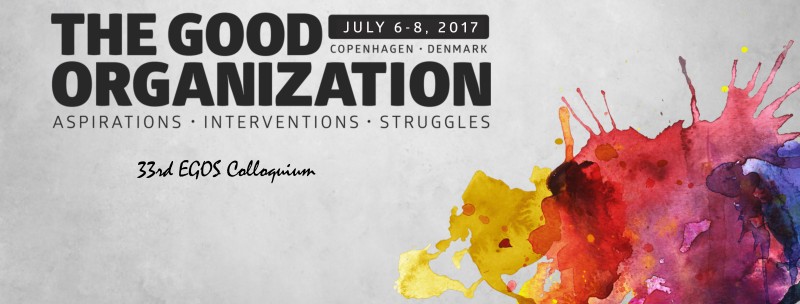Sub-theme 09: (SWG) The Lived Experiences of Paradoxes: Passions, Defenses and Competing Demands
Call for Papers
Paradoxes pervade our organizational experiences. These ‘contradictory, yet interdependent elements’ (Smith & Lewis,
2011) challenge our established certainties, while inviting our untapped creativity. Their dynamic, uncertain nature elicits
strong emotional responses. Effectively seeing and engaging the power of paradox depends on the ability to be vulnerable and
open, yet often their ambiguous and complex nature triggers defensiveness and resistance. Moreover, emotions themselves are
often paradoxical – joy can elicit melancholy, while melancholy is often a precursor to joy. Even as our emotions critically
inform our experience of paradox, our scholarship offers little insight into this relationship, focusing more acutely on the
role of cognition and action (Schad et al., 2016).
In this sub-theme, we continue to welcome research and
scholarship that broadly addresses issues of organizational paradox. However, we also want to shine a light on the role of
emotions in paradox, inviting scholars to question, examine and illuminate how we experience and respond to interdependent
contradictions.
Take, for example, the overall EGOS 2017 theme, “The Good Organization – Aspirations, Interventions,
Struggles”. Goodness is rarely straightforward and positive. It can be tinged with envy, conceal hatred, or provide the basis
of emotive strategies for control. Within leadership roles, for example, we are not always aware of the interdependence of
harm and helpfulness in our leadership behavior (Vince & Mazen, 2014). We hope and aspire to be ‘good’ leaders at the
same time as we project the emotional force of our ‘unwanted self’ as a leader onto others (Petriglieri & Stein, 2012).
The ongoing tensions and contradictions of our experience within such roles provide an opportunity to recognize organizations
as complex environments of contrasting yet intersecting affective dynamics.
It will be useful to examine
further the everyday experiences, dynamics and impact of emotions such as ambivalence or anxiety that produce persistent,
contradictory individual and collective experience. For example, ambivalence may surface latent paradoxical tensions and enhance
our understanding of organizational life (Ashforth et al., 2014; Pratt & Pradies, 2011).
In addition,
there is a resurgence of interest in the inseparability of affect and power (Kenny & Fotaki, 2014; Thompson & Willmott,
2015). Also, explorations of psychoanalytic theory and paradox (Jarrett & Vince, 2017) may offer opportunities to better
understand the impact of unconscious dynamics in generating contradictions, as well as the political effects of fantasy. Finding
ways to study the paradoxical tensions mobilized by unconscious responses, defenses and fantasies can help us to understand
more about the role of persistent contradictions in both limiting and liberating individual and collective behavior. Through
a paradox lens we may be able to discover more about affective contradictions and their everyday practical and political implications
in organizations.
EGOS has provided a strong community for paradox scholars. In this Call for Papers, we
continue to invite scholars to explore the dynamics of paradox broadly. We also hope this sub-theme will extend previous insights
from an EGOS paradox sub-theme to invite a focus on theoretical and empirical papers that contribute to understanding the
paradoxical interplay of emotions in organizations; emotional dynamics and processes of organizing that generate and support
ongoing tensions; and the paradoxical links between emotions and power relations. There are several current avenues of scholarship
on emotions that seem highly relevant to paradox studies. We outline some below:
- How can paradox studies help to understand the continuous interplay between rationality and emotion in organizations?
- In what ways can a paradox lens help us to comprehend affect as central to social and political analysis?
- What is the role of emotions – anxiety, ambivalence, vulnerability – in sustaining or leveraging paradoxical tensions? What are the consequences for management and organization?
- How can a paradox lens help to shine a new light on collective emotional dynamics?
- How can paradox studies help us to understand and improve existing theories of emotion and affect in organizations? How does paradox help us understand the relationship between different emotions? Or the relationship between emotions and cognition?
References
- Ashforth, B.E., Rogers, K.M., Pratt, M.G., & Pradies, C. (2014): “Ambivalence in organizations: A multilevel approach.” Organization Science, 25 (5), 1453–1478.
- Kenny, K., & Fotaki, M. (2014): The Psychosocial and Organization Studies. London: Palgrave Macmillan.
- Jarrett, M., & Vince, R. (2017): “With a Shadow of a Doubt: Emotion and the psychoanalytic foundations of organizational paradox.” In: M.W. Lewis, W.K. Smith, P.Jarzabkowski & A. Langley (eds.): The Handbook of Organizational Paradox: Approaches to Plurality, Tensions and Contradictions. Oxford: Oxford University Press [forthcoming].
- Petriglieri, G., & Stein, M. (2012): “The unwanted self: Projective identification in leaders identity work.” Organization Studies, 33, 1217–1235.
- Thompson, M., & Willmott, H. (2015): “The social potency of affect: Identification and power in the immanent structuring of practice.” Human Relations, 69 (2), 483–506.
- Pratt, M.G., & Pradies, C. (2011): “Just a good place to visit? Exploring positive responses to psychological ambivalence.” In: K. Cameron & G. Spencer (eds.): Handbook of Positive Organizational Scholarship. Oxford: Oxford University Press, 924–937.
- Schad, J., Lewis, M., Raisch, S., & Smith, W.K. (2016): “Paradox research in management science: The first 25 years and the next 25 years.” Academy of Management Annals [in press].
- Smith, W.K., & Lewis, M.W. (2011): “Toward a theory of paradox: A dynamic equilibrium model of organizing.” Academy of Management Review, 36 (2), 381–403.
- Vince, R., & Mazen, M. (2014): “Violent Innocence: A Contradiction at the Heart
of Leadership.” Organization Studies, 35 (2), 189–207.


